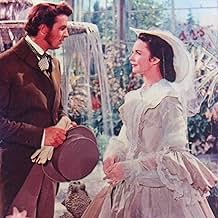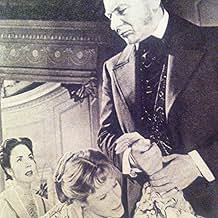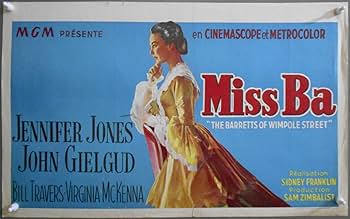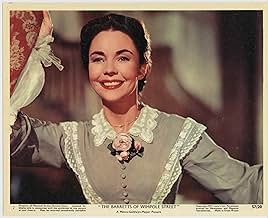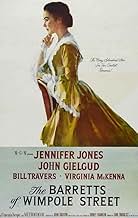IMDb RATING
6.5/10
619
YOUR RATING
Elizabeth Barrett's tyrannical father has forbidden any of his family to marry. Nevertheless, Elizabeth falls in love with the poet Robert Browning.Elizabeth Barrett's tyrannical father has forbidden any of his family to marry. Nevertheless, Elizabeth falls in love with the poet Robert Browning.Elizabeth Barrett's tyrannical father has forbidden any of his family to marry. Nevertheless, Elizabeth falls in love with the poet Robert Browning.
Christopher Cooke
- Minor Role
- (uncredited)
- Director
- Writers
- All cast & crew
- Production, box office & more at IMDbPro
Featured reviews
1957's 'The Barretts of Wimpole Street' is not the first version of Rudolf Beiser's stage play or the real life romance of Elizabeth Barrett and Robert Browning. There is also the 1934 film, seen two years ago, with Fredric March, Norma Shearer and Charles Laughton and aslso directed by Sidney Franklin, which is on the whole a great film especially the performances of Shearer and Laughton (March and the overlength being the weak links). Despite being nervous about it being an extremely close remake, it was still seen anyway because of the story and for the wonderful Sir John Gielgud.
Actually found this a well worth watching and worthy remake, or more other version, and it fares better than quite a lot of them. The reason why there was apprehension about this is due to having seen some very close, word for word, shot for shot remakes that are abysmally executed, a very strong example being 1998's 'Psycho', and was really hoping that it would not be on that level. Thankfully it's not and it didn't feel completely pointless, as there is enough for it to stand on its own and a lot works on its own merits. The earlier film is the superior film definitely in my view, but this version of 'The Barretts of Wimpole Street' shouldn't immediately be written off.
'The Barretts of Wimpole Street' isn't perfect. It does drag at times, the original did do as well but not as significantly, especially in the final act which feels over stretched and lacks tension.
Did feel too that it does focus a little too much on the romance, which isn't as intriguing or as atmospheric as the father and daughter relationship (which was always more interesting before) and it is here where some over faithfulness is apparent. That Bill Travers is on the bland side at times doesn't help.
However, there are a lot of things done right. It is very sumptuously and atmospherically made and doesn't feel too stagy. Jones looks absolutely beautiful in her costumes. Bronislau Kaper's score is haunting and lusciously scored without being too melodramatic. Franklin gives direction as polished, as sensitive and as distinguished as other works of his and throughout 'The Barretts of Wimpole Street' is written with great intelligence and dignity. It doesn't suffer from being too talky like other play-to-film adaptations did at the time and the story remains gripping and didn't feel draggy or creaky mostly.
Especially in the father and daughter relationship which effectively gives one the shivers and has some real intensity. Travers and Jones do have some nice subtle chemistry but it doesn't have the same impact as the chemistry between Jones and Gielgud. The supporting cast are solid and Jones gives a nuanced, deeply felt performance (didn't think her pallid at all), but the acting honours go to Gielgud at his most sinister as a monster of a character.
In summary, well worth watching and worthy. 7/10.
Actually found this a well worth watching and worthy remake, or more other version, and it fares better than quite a lot of them. The reason why there was apprehension about this is due to having seen some very close, word for word, shot for shot remakes that are abysmally executed, a very strong example being 1998's 'Psycho', and was really hoping that it would not be on that level. Thankfully it's not and it didn't feel completely pointless, as there is enough for it to stand on its own and a lot works on its own merits. The earlier film is the superior film definitely in my view, but this version of 'The Barretts of Wimpole Street' shouldn't immediately be written off.
'The Barretts of Wimpole Street' isn't perfect. It does drag at times, the original did do as well but not as significantly, especially in the final act which feels over stretched and lacks tension.
Did feel too that it does focus a little too much on the romance, which isn't as intriguing or as atmospheric as the father and daughter relationship (which was always more interesting before) and it is here where some over faithfulness is apparent. That Bill Travers is on the bland side at times doesn't help.
However, there are a lot of things done right. It is very sumptuously and atmospherically made and doesn't feel too stagy. Jones looks absolutely beautiful in her costumes. Bronislau Kaper's score is haunting and lusciously scored without being too melodramatic. Franklin gives direction as polished, as sensitive and as distinguished as other works of his and throughout 'The Barretts of Wimpole Street' is written with great intelligence and dignity. It doesn't suffer from being too talky like other play-to-film adaptations did at the time and the story remains gripping and didn't feel draggy or creaky mostly.
Especially in the father and daughter relationship which effectively gives one the shivers and has some real intensity. Travers and Jones do have some nice subtle chemistry but it doesn't have the same impact as the chemistry between Jones and Gielgud. The supporting cast are solid and Jones gives a nuanced, deeply felt performance (didn't think her pallid at all), but the acting honours go to Gielgud at his most sinister as a monster of a character.
In summary, well worth watching and worthy. 7/10.
Being owned by two English cocker spaniels my comments are a bit biased.
This film is intriguing, not just for the overall story but the way Flush, Elizabeth's cocker, was so much integral part of it. Given the 120 line poem that she wrote about Flush it was pleasing to see that Flush was very much a part of the movie.
Sir John Gielgud was a superb actor cast in the role of Elizabeth's tyrannical father. Jennifer Jones performance above par. And of course there was Flush. One very lucky cocker spaniel.
This film is intriguing, not just for the overall story but the way Flush, Elizabeth's cocker, was so much integral part of it. Given the 120 line poem that she wrote about Flush it was pleasing to see that Flush was very much a part of the movie.
Sir John Gielgud was a superb actor cast in the role of Elizabeth's tyrannical father. Jennifer Jones performance above par. And of course there was Flush. One very lucky cocker spaniel.
"The Barretts of Wimpole Street" (1957) is a word-for-word remake of the classic 1934 version by the same name. And, as such, I wonder why anyone should even bother seeing this film. After all, since the original version was a very nice and well-acted film (despite Charles Laughton overacting a bit), I can't see seeing a re-make--especially one that took almost no effort to make. Now I am not saying the 1957 film is bad--it is lovely to look at and the story is interesting. I just don't believe in rewarding studios for slap-dash remakes. In fact, unless the original film is seriously flawed and the remake corrects this, I can see no logical reason to see the remake and usually make it a habit to avoid them! So why did I watch the 1957 film? Well, I was flying cross-country and this film was one of the choices on the menu for in-flight films. And, in this sense, it fit the bill--and was pleasant but not particularly inspired.
Throughout this film, I kept thinking of Director Wm. Wyler's adaptation of Henry James's novel, with Olivia de Havilland in "The Heiress." What made that a better movie? was it the casting? the directing? the actor chemistry? or all of the above? Previous reviewers of "Barretts" all praised Gielgud's acting, but I wondered why he accepted the role, or could stand himself in it. I could barely view him on screen, so wooden, so inhuman was his incarnation of Moulton Barrett: this was not a person, it was a caricature. Compare, instead, Ralph Richardson's interpretation of a similar emotion-starved and pathologically driven father in his love for his daughter.
As for the casting of Bill Travers as Robert Browning, I felt he lacked any subtlety, any "poetry" in his manner, any semblance of an understanding of female psychology or charm, most of all, lacked any chemistry with Jones as Elizabeth. He seemed to be barking all of his lines as if he were on the football field. Can you imagine his role cast instead with, say David Farrar, or one of the Ealing Studio regulars? Fans of Jennifer Jones may still want to sit through this movie to see her conception of the poetess. But when we compare this role with her performance in, say, "Wild at Heart [Driven to Earth]," the great Powell-Pressburger film, or even "Madame Bovary," it falls far short of full realization. In those films, she revealed passion, coyness, charm and geniune fear, gripping us with the emotions of her predicament. As noted by another reviewer, here she appears far too healthy, even too mature (although that would be an accurate estimation of her actual age when she met Browning, according to her biography) to be believable. Of course we can accept some cinematic license -- we don't have to expect that Mimi should actually be consumptive in "La Boheme"--but Jones's conception confused strength of character with bodily health -- her fainting on the stairs was almost a joke, more a sign of her rare weakness as an actress. In fact, one actually felt more pity for her sister, as portrayed by Virginia McKenna, in a lively,deeply felt role, in which we feared for Henrietta's emotional health and future in that stifling household.
So, shall we lay the blame at the foot of the hapless director Sidney Franklin? All the settings, the costumes, even the lovely tune, beautifully sung by Jones at the piano should have offered the right support. The clumsiness of the production is almost encapsulated in that little scene around the piano: when Jennifer sings it (whether or not she herself indeed voiced it), there is lyricism and musicality, and one longs for her to continue, but everyone, namely her brothers, is urged to join in. None of them can really sing, they shout out the melody, drowning Elizabeth's soprano, and the whole scene, at least for this viewer, is ruined. Just like the movie.
Of a possible four ****, I give it my lowest rating one star*.
As for the casting of Bill Travers as Robert Browning, I felt he lacked any subtlety, any "poetry" in his manner, any semblance of an understanding of female psychology or charm, most of all, lacked any chemistry with Jones as Elizabeth. He seemed to be barking all of his lines as if he were on the football field. Can you imagine his role cast instead with, say David Farrar, or one of the Ealing Studio regulars? Fans of Jennifer Jones may still want to sit through this movie to see her conception of the poetess. But when we compare this role with her performance in, say, "Wild at Heart [Driven to Earth]," the great Powell-Pressburger film, or even "Madame Bovary," it falls far short of full realization. In those films, she revealed passion, coyness, charm and geniune fear, gripping us with the emotions of her predicament. As noted by another reviewer, here she appears far too healthy, even too mature (although that would be an accurate estimation of her actual age when she met Browning, according to her biography) to be believable. Of course we can accept some cinematic license -- we don't have to expect that Mimi should actually be consumptive in "La Boheme"--but Jones's conception confused strength of character with bodily health -- her fainting on the stairs was almost a joke, more a sign of her rare weakness as an actress. In fact, one actually felt more pity for her sister, as portrayed by Virginia McKenna, in a lively,deeply felt role, in which we feared for Henrietta's emotional health and future in that stifling household.
So, shall we lay the blame at the foot of the hapless director Sidney Franklin? All the settings, the costumes, even the lovely tune, beautifully sung by Jones at the piano should have offered the right support. The clumsiness of the production is almost encapsulated in that little scene around the piano: when Jennifer sings it (whether or not she herself indeed voiced it), there is lyricism and musicality, and one longs for her to continue, but everyone, namely her brothers, is urged to join in. None of them can really sing, they shout out the melody, drowning Elizabeth's soprano, and the whole scene, at least for this viewer, is ruined. Just like the movie.
Of a possible four ****, I give it my lowest rating one star*.
Although not as engaging as the original play, This film adaptation of BARRETTS OF WIMPOLE ST is a very well made film. John Gielgud gives one of his finest screen performances as Edward Barrett, he is despicable yet worthy of pity. Jennifer Jones is strong as Elizabeth and her character unfolds beautifully before your eyes. The actors who play the clan of brothers nicely delineate each role so they are individuals and not a unit. this film does suffer a bit from the over emphasis on the elizabeth/browning relationship as opposed to the father/daughter one but I suppose this was the hollywood trend toward romance at the time.
Did you know
- TriviaBill Travers and Virginia McKenna got married in September 1957, after the January 1957 release of this film. Travers plays the role of poet Robert Browning, Elizabeth's love interest, and McKenna plays Henrietta, Elizabeth's younger sister.
- GoofsThe London pillar boxes weren't painted red (as seen) until 1874; before that, they were green.
- ConnectionsReferenced in Wogan: Episode #10.35 (1990)
- SoundtracksWilt Thou Have My Hand
Music by Herbert Stothart
[Elizabeth and all her siblings sing the song in her bedroom as she plays the piano; theme heard in the score throughout the movie]
Details
- Release date
- Countries of origin
- Language
- Also known as
- Miss Barrett
- Filming locations
- Marylebone Church, Marylebone, London, England, UK(wedding sequence)
- Production company
- See more company credits at IMDbPro
- Runtime1 hour 45 minutes
- Aspect ratio
- 2.55 : 1
Contribute to this page
Suggest an edit or add missing content





